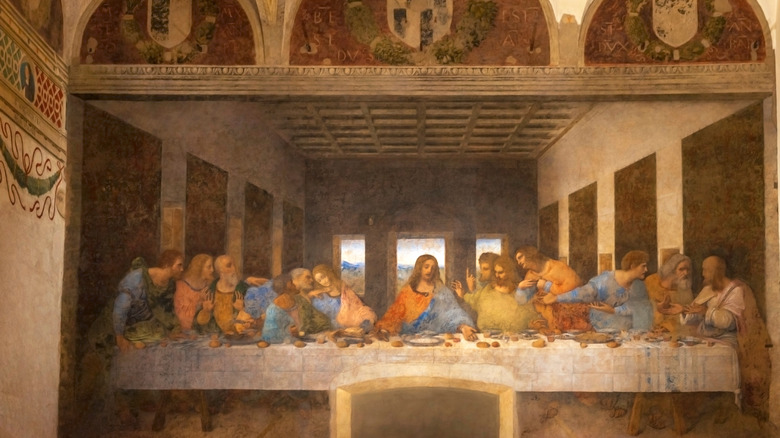Who Was Judas Iscariot, The Disciple Who Betrayed Jesus Christ?
Judas Iscariot is most well known for betraying Jesus Christ by selling him out to the chief high priests, which in turn led to Jesus' arrest and crucifixion. Today, Judas' name is synonymous with traitor. But besides betraying Jesus, not much is known of Judas, unlike the other Apostles. In fact, Judas is the only Apostle not to have a story on how Jesus called him, and for most of Jesus' time, Judas is just simply with the group, according to Britannica.
His name implies that he was from the Sicarii, a radical Jewish faction during the time. The Sicarii got their name from the daggers they carried, known as sicæ. They were famous assassins who often killed Roman sympathizers, usually at assemblies or during the pilgrimage to the Temple mount (via Jewish Encyclopedia). However, some people believe that Judas' last name doesn't imply that he was a member of the radical organization; instead, his last name comes from the Latin word sicarius, which means assassin or murderer, according to Britannica.
The origins of Judas
Another interpretation of Judas Iscariot's last name is that he is from the town of Kerioth, Judea, according to Learn Religions. This would make Judas the only Apostle who was not from Galilee, if that was the case.
Rather than his last name, not much is given on the origins of Judas. He is referred to as Judas the son of Simon, but who Simon Iscariot was is unknown. What is known, however, is that Judas was the treasurer for Jesus and the other Apostles, but he was known to steal from the common purse from time to time, according to Britannica.
Eventually, Judas was given 30 silver pieces in exchange for the location of Jesus, and at the Garden of Gethsemane, Judas kissed Jesus on the cheek to identify him to the authorities, which led to Jesus' subsequent arrest and crucifixion on the cross, according to Learn Religions. After Jesus' death, according to the Gospel account, it is said that Judas felt guilty for his actions, returned the silver pieces, and killed himself. However, there are different variations of this story. In one version he returned the silver and hanged himself, whereas in another story he bought a field and threw himself down, and his bowels burst out from under him, according to Britannica.
If you or anyone you know is having suicidal thoughts, please call the National Suicide Prevention Lifeline by dialing 988 or by calling 1-800-273-TALK (8255).
Who is to Blame?
Why Judas Iscariot betrayed Jesus is up for debate, and some argue about who actually did the betraying, and for what reason. Some speculate that Judas betrayed Jesus because he wanted Jesus to lead an all-out anti-Roman rebellion, which would also help the hypothesis that he was from the Sicarii group, who were known for their hatred of the Roman Empire, according to Learn Religions. Others argue that it was pure greed that led Judas to betray Jesus, as Mark and Matthew claimed in the Bible (via Learn Religions).
Some make the argument that Judas didn't act out of free will; rather, it was Satan who possessed his body and forced him to betray Jesus. In the New Testament, John 13:27 says "As soon as Judas took the bread, Satan entered into him ... So Jesus told him, 'What you are about to do, do quickly.'" This supports the idea that Judas had no control over his situation, and that it was Satan who caused Judas to sell out Jesus, ending in the crucifixion. However, different religions and small sects of Christianity view Judas in a different light, such as the Gnostics and Muslims.
Gnosticism
In Gnosticism, considered a heresy by Christianity, followers believe that the material world is evil, given how it is impermanent and eventually decays and dies. Gnostics believe that there is a transcendent god which is outside of the material realm, and that is the true holy God; the god that the Jewish people worship, known as Yahweh, is the evil god of the material realm since he created it. In the Gnostics' view, since Yahweh, also known as Ialdabaoth, is the creator of the material world, and the material world is evil, Yahweh is evil as well, according to Bible Odyssey.
Gnostics believe that all people have bits of God within them and that only through knowledge of the universe and battling ignorance can one fully know their true self, according to World History Encyclopedia. A lot of these ideas came from Plato, who believed God was a higher good outside of the material world. The Gnostics also claimed that the philosophy of awakening the God inside you came from Jesus directly, through the messages of the Apostles, which were supposedly passed down to their bishops, according to the World History Encyclopedia. The Gnostics had their own views on Judas Iscariot, and even wrote a whole Gospel for him, which was revealed in 2006 by National Geographic.
The Gospel of Judas
There have been many controversies surrounding the National Geographic translation of the Gospel of Judas, and that has led to multiple interpretations of the text, which is not accepted as part of the canon of the New Testament. When National Geographic first released the Gospel of Judas in 2006, they claimed that Judas was not actually a betrayer of Jesus Christ, but rather he was Jesus' best friend and that Jesus wanted to be freed of his physical form, and asked Judas to do this for him, according to National Geographic.
However, as time has passed, more scholars have translated the book, and some errors in the first translation have been corrected. Instead of being Jesus' best friend, Judas is instead the human incarnation of Ialdabaoth, also known as the 13th Demon, since in Gnostic theology Ialdabaoth resides in the 13th Dimension, according to Bible Odyssey. Jesus then claims that the other Apostles are ignorant priests who are teaching Christians to swear loyalty to the evil Ialdabaoth, and that Jesus is ultimately sacrificed for this demon. This is believed to be a way of explaining the inconsistency in Jesus' sacrifice for our sins through the uncontrollable fate of Judas, since Satan controlled Judas, which turned him into a murderer and traitor (via Bible Odyssey).
Muslim views of Judas
In Muslim theology, Judas Iscariot is not seen as a traitor at all and is even seen as a protector of Jesus Christ, according to Britannica. In Islam, Jesus is a revered prophet who is believed to be born out of a miracle. Muslims believe that God did cause the Virgin Mary to conceive Jesus without a father, and that Jesus did miraculous things in his life. In the Quran, as an infant Jesus said, "Indeed, I am the servant of Allah. He has given me the Scripture and made me a prophet ... And He has made me blessed wherever I am and has enjoined upon me prayer and zakah as long as I remain alive" (via Al-Qur'aan 19:30-31).
In a similar fashion to the Bible, Jesus went on to heal the sick, cure disease, and even resurrect the dead. But where the story differs is his crucifixion. According to Britannica, Judas Iscariot lied to the Jews in order to save Jesus from his punishment and helped Jesus escape, since he was never crucified in Islamic belief. Muslims believe that Jesus was sent up into Heaven to return at some point in the distant future, according to Muslim Unity Center. Depending on who you ask, Judas Iscariot would be described in a number of contradictory ways, but what is for certain is that without Judas' involvement in the life of Jesus, Christianity and its impact would be seen in a very different way than they are today.





